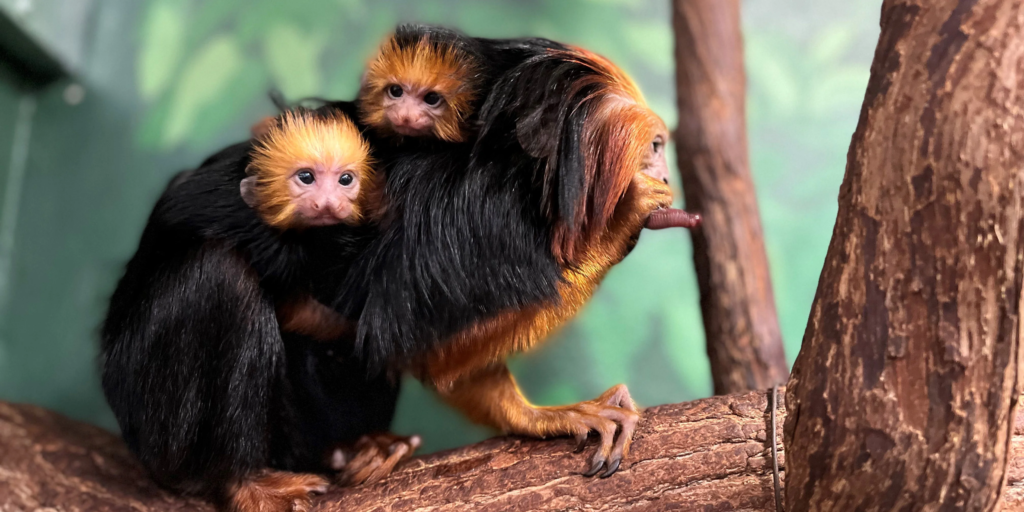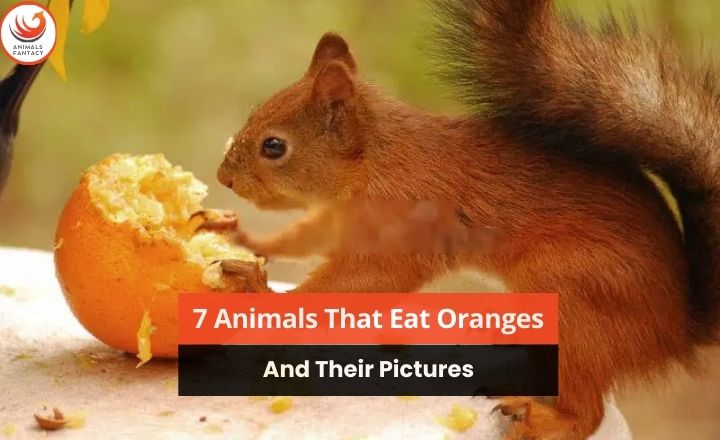Oranges are not just a favorite fruit for humans; they also play a vital role in the diets of several fascinating animals such as seven animals that eat oranges in the wild, from tropical birds to primates and even insects. The allure of this juicy citrus fruit extends far beyond their enjoyment.
Let’s explore what animals eat oranges. We will be surprised by how these creatures interact with oranges and gain a new appreciation for the role oranges play in the wild.
List Of Animals That Eat Oranges
Here is the list of animals love to eat oranges.
- Squirrel Monkeys
- Tamarins
- Red-bellied Woodpeckers
- Northern Mockingbirds
- Squirrels
- Raccoons
- Black Rats
Squirrel Monkeys
Scientific Name: Simia sciurea
Class: Mammalia

Squirrel monkeys are known for their cute faces and playful behavior, making them a beloved species in the animal kingdom. They have big brains that help them solve problems and understand social situations.
In the wild, they like oranges, which tells us about their diet and how important fruit is for them. They are good at finding food, hunting insects, and eating juicy fruits. Even though they are small, reaching only about 35 centimeters, they have long tails measuring over 40 centimeters.
Tamarins
Scientific Name: Saguinus ursulus
Class: Mammalia

Tamarins, small monkeys from the Americas, like to eat oranges, even though they mainly eat fruit. This shows that they can adapt to different foods and that having a varied diet is essential. Oranges give tamarins crucial nutrients like vitamin C and fiber, which help keep them healthy.
In the wild, tamarins are very good at peeling and eating oranges, showing how skilled they are at finding food and why they must have different kinds of food. Tamarins eating oranges gives us a good idea of their place in the environment and how closely connected they are to the fruit where they live.
Red-bellied Woodpeckers
Scientific Name: Melanerpes carolinus
Class: Aves

Red-bellied Woodpeckers mainly eat insects in wood, but they also like oranges. Oranges give them a juicy, tasty snack and essential vitamins and nutrients. The sweet orange pulp attracts these exciting birds and adds variety to their diet.
Watching Red-bellied Woodpeckers eat oranges is impressive, as they skillfully hold the fruit and peck at it to get the tasty juice. This surprising food choice shows that these woodpeckers can adapt and find different foods. It’s a reminder that animals can have unexpected diets.
Northern Mockingbirds
Scientific Name: Mimus polyglottos
Class: Aves

Northern Mockingbirds have a diverse diet, including fruits like oranges. They peck at oranges to eat the juicy flesh, showing their adaptability and resourcefulness.
Like humans, they like the sweet, tangy flavor and nutrition of oranges. Northern Mockingbirds can learn 200 songs of other birds and insects. It’s fantastic to hear them mimic their surroundings.
This shows how birds and fruit-bearing plants help each other, emphasizing the importance of protecting natural ecosystems where these interactions happen. Watching Northern Mockingbirds enjoy oranges gives us a glimpse into nature’s food web and shows the significance of every living organism in maintaining balance.
Squirrels
Scientific Name: Sciuridae
Class: Mammalia

Squirrels usually eat nuts and seeds but also like to snack on oranges. This shows that they have diverse taste preferences. Oranges give squirrels essential nutrients like vitamin C and fiber, which help them stay healthy in the wild.
When squirrels eat oranges and then spread the seeds in their droppings, it helps new orange trees grow in different places. This shows how squirrels and oranges are connected and how different species depend on each other.
Raccoons
Scientific Name: Procyon lotor
Class: Mammalia

Raccoons, often seen as scavengers with a voracious appetite for anything they can get their paws on, might surprise many when it’s revealed that these creatures are pretty fond of oranges.
Raccoons mostly eat plants and animals, but they also like sweet things and are drawn to oranges’ tasty, tangy flavor. They use their strong sense of smell to find fruit trees and gardens where they can eat oranges.
It’s interesting to see raccoons carefully peel an orange with their clever paws, showing how good they are at getting food. Eating oranges is vital for raccoons because they have a lot of vitamin C, which is essential for them, especially when there isn’t much other food around. Also, the natural sugars in oranges give raccoons a good energy boost for their nighttime activities.
Black Rats
Scientific Name: Rattus rattus
Class: Mammalia

Black rats, also called roof rats, really like oranges. Even though people think of them as pests, these small rats love the sweet and juicy insides of oranges. They mainly eat fruits and vegetables, so oranges are a special treat. It’s interesting to see that black rats like oranges. The natural sweetness and lots of water in oranges appeal to these clever animals.
This behavior shows how adaptable and varied the diet of black rats is in cities where they live with people. While we usually think of them as looking for scraps or stealing food, the fact that they look for oranges shows that they can find many different foods.
Knowing these details about what animal eats oranges can help us find better ways to control city rat populations.
Final Words
The variety of Animals That Eat Oranges showcases the versatility and appeal of this citrus fruit across different species. Animals like elephants and birds eat oranges because they are nutritious and easy to find in the wild.
Seeing these animals eat oranges reminds us how we are connected to wildlife and why protecting their homes is essential. Understanding how different animals use oranges helps us see how vital this fruit is in ecosystems worldwide. We should work to protect the environment and its creatures for the future.
FAQs
1. What Animals Eat Oranges?
Many animals like to eat oranges, such as birds like orioles, tanagers, and mockingbirds. They are drawn to the sweet taste and high water content of oranges. Deer and raccoons also eat oranges when they find them in orchards or gardens.
2. What Animals Eat Orange Peels?
Animals do not eat orange peels, but certain insects and small mammals can eat them. Ants, beetles, and caterpillars are some of the insects that feed on decaying organic matter, like orange peels. They help break down organic material and return nutrients to the soil.
3. Do Monkeys Eat Oranges?
Monkeys eat oranges because they are a good source of vitamin C and other nutrients. Monkeys may look for fruits like oranges in the wild as part of their natural diet. Zoos and wildlife sanctuaries give oranges to monkeys to encourage natural behaviors and provide essential nutrients.
4. Do Deer Eat or Like Oranges?
Deer show a strong preference for pears, apples, and persimmons when it comes to fruit trees, although they are also willing to eat plums. Certain types of pears and apples are especially favored by deer.
5. Can Squirrels Eat Oranges?
Squirrels have a diverse diet, indulging in berries, fruits, and succulent plants. They relish oranges, apricots, corn, and avocados. If you find bite marks on your garden crops, you might wonder if squirrels eat apples. The answer is yes ,they do enjoy them.
6. Do Raccoons Eat Oranges?
If we forget to bring in the citrus at night, a raccoon might come along and consume the remaining orange before washing it down with hummingbird food. Raccoons are drawn to sugary treats, particularly fresh fruit like apples, peaches, and plums. They also enjoy snacking on apricots, cherries, and mulberries.

